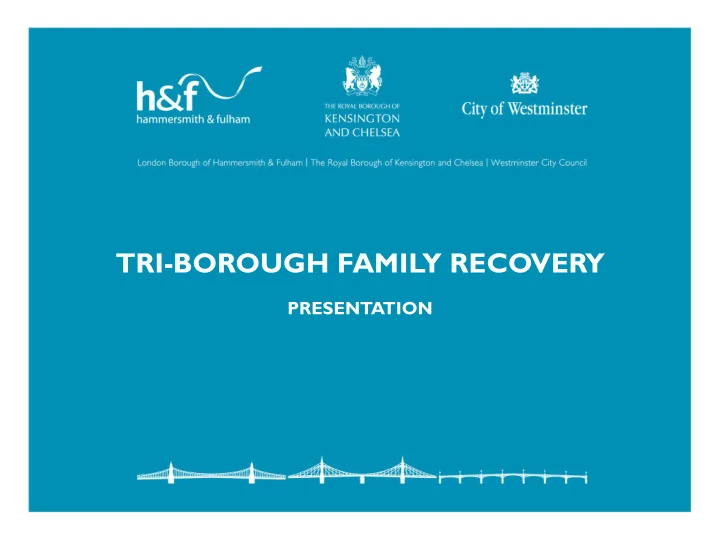

TRI-BOROUGH FAMILY RECOVERY PRESENTATION
THE TRI-BOROUGH TROUBLED FAMILIES PROJECT Troubled Families: where it began • Post riots 2011 – renewed commitment (with some notable changes of emphasis) to what previous govt. had worked on in Think Family and the Family Intervention Programme • In December 2011 The PM committed to “turn around the lives of 120,000 troubled families” by 2015 • Appointment of Louise Casey to lead at DCLG • What’s in a name? ‘Troubled Families’ has not been a popular with delivery projects. In the tri-borough it will be called: Family Recovery Programme . The initiative encompasses the existing WCC Family Recovery Project and RBKC’s Families Forward(FIP).
The Troubled Families criteria The project will work with families who have problems in the following areas: • School attendance: absence, truancy or exclusion from school, attendance PRU • Crime and anti-social behaviour – adult and /or child. • Employment: adults claiming out-of-work benefits NB This is a payment by results programme. In order to qualify to secure attachment fees and PBR , families have to fit 2 of the criteria and to show turn around in relation to these.
THE TRI-BOROUGH PROGRAMME 4
Anti-Social Behaviour – a broadening of the criteria in March 2013 The formal DCLG ASB criteria – Households where 1 or more member has an ASBO, ASB injunction, anti‐social behaviour contract (ABC), or where the family has been subject to a housing‐related ASB intervention in the last 12 months (such as a notice of seeking possession on ASB grounds, a housing‐related injunction, a demotion order, eviction from social housing on ASB grounds1). The DCLG has informally broadened this criteria to include : • Households where a member is known to the police as affiliating with gangs • Households where police have been called out on multiple occasions over the past 12 months (Any address where there has been 3 or more calls, where a child was present) • Households where there have been multiple noise complaints (Any address where there has been 3 or more calls) • Households identified by housing providers as being known for ASB Questions: 1. How do we capture this information for identification and evaluation of ASB for referrals and to audit / track outcomes? 2. Are there other ASB criteria that you record that are not listed above?
The Interventions - a 3 tiered offer. There are 32 (FTE) workers plus 3 managers offering additional for intensive interventions to 250 families for 6 months duration and 42 families will receive highly intensive interventions for 12 months .
What is Tri- borough Triage ? • Staffed by 2 analysts, fed by LA, school and police intel with social work decision maker • Identifies families that meet the criteria and manages live referrals • Takes live referrals from vol. and community sector and pays £100 for an effective referral. • Creates a single view of the family from a range of data sets • In doing so creates a new information product re. families in question • Once a family has met two of the criteria, triage discusses referral with referrer/ lead agency and agrees which service the family will be offered • Is separated from delivery – ensuring autonomy of decision making • With discretion, will offer an information package to some professionals to ensure a fuller view of relevant information • Allocating families to appropriate service inc TF offer but also MST and ESF.
The new offer: Family Coaching Service: - high complexity, medium intensity of intervention (40% of cohort) ● A wrap around service complementing the core services ● Appointment of a key worker known as a Family Coach who will help ● Prioritise activity and reduce the number of professionals visiting the family ● The Family Coach will deliver some interventions directly and will support the family to practically address issues of, for example, of debt, housing, parenting and mentoring though direct work and phasing priorities, and support engagement with existing services e.g. health ● Family coach would have a case load of approximately 8-10 families and typically see the family at least once per week plus telephone coaching ● Role of case management – gripping the family to progress the care plan by frequent review and use of the intelligence package ● Application of choices and consequences approach – coordinated use of sanctions ● Capacity building - encouraging resilience
Families Forward • Intensive family support only max 6 families at one time • Visits up to 3 x per week • Addressing practical needs • Challenging behaviour • Modelling parenting inc dealing with conflict , setting routines • Teaching life skills inc budgeting , debt management • Particular skills with parents with moderate learning disability.
Key contacts T o make a referral in any of the 3 boroughs: triboroughfamilyrecovery@westminster.gov.uk or call 0207 641 2525 To discuss an open case: Family coaches: Rschofieldteal@westminster.gov.uk atoplicabadivuku@westminster.gov.uk Families Forward : letitia.bradley@RBKC.gov.uk
London Borough of Hammersmith and Fulham | The Royal Borough of Kensington and Chelsea | Westminster City Council
Recommend
More recommend